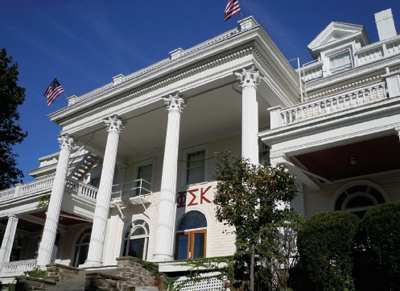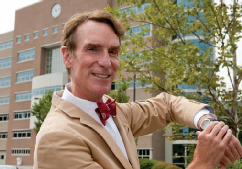
In the wake of the death of a sophomore in an alleged hazing incident, President David Skorton has announced an overhaul in the fraternity and sorority pledging system. “Although pledging is justified as a period of time during which pre-initiates, or ‘pledges,’ devote themselves to learning the information necessary to become full members, in reality, pledging is too often the vehicle for activities that are dangerous or demeaning,” Skorton says. “This must stop.” The University is working with Greek student leaders to develop a new member recruitment and initiation process, to be implemented in 2012-13.
Although hazing has been prohibited at Cornell since 1980— and illegal in New York State since 1983—the pledging process has come under particular scrutiny since the February death of George Desdunes ’13, who was found unconscious after a night of heavy drinking at Sigma Alpha Epsilon. His mother has filed a $25 million wrongful death lawsuit against the fraternity and more than a dozen of its members; several students face criminal charges and SAE has been banned from campus for at least five years. “For far too long, campuses like ours have worked to be rid of hazing practices, but those efforts have not been successful,” Skorton says. “Anything less than a complete overhaul of the pledging process to bring people into our organizations will result in more of the same. We cannot simply ‘try harder.’
We need a clean break with the past.” The executive committee of the Board of Trustees has passed a resolution supporting Skorton’s efforts.
Oldest Alumna Dies at 109

Helen “Happy” Keane Reichert ’25, believed to be Cornell’s oldest living graduate, died on September 25 in her New York City apartment. She would have been 110 on November 11. A longtime copywriter and educator, she taught at NYU’s Graduate School of Retailing for thirty years after earning a master’s at Columbia Teaching College. In 1949 she founded the Round Table of Fashion Executives to better represent women in the industry, and in 1951 she began hosting a television talk show, “FYI: The Helen Faith Keane Show,” on WNEW; it earned her a McCall’s Magazine Golden Microphone Award for outstanding service to women. Reichert’s husband, cardiologist Philip Reichert, MD ’23, passed away in 1985. Her survivors include two brothers, also centenarians.
Reichert—who, as a Girl Scout, sold World War I bonds outside the New York Public Library—became familiar to listeners of NPR in April, when she was the subject of a commentary piece by her gerontologist, Medical college professor Mark Lachs. In the story, he was asked whether Reichert attained her advanced age through abstemious living. “No,” Lachs said, “Helen Reichert likes chocolate truffles. Her favorite beverage is Budweiser. And she once announced to me that she was thinking about smoking again. When I protested, she reminded me that she has outlived several other physicians and told me to mind my own business.”
Oberlin Director Tapped for Johnson Museum
Stephanie Wiles, head of the Allen Memorial Art Museum at Oberlin College since 2004, has been named the new Richard J. Schwartz Director of the Johnson Museum of Art. She succeeds Frank Robinson, who retired in June after nineteen years, segueing to a job in Cornell’s development office. At Oberlin, Wiles oversaw a building renovation and art storage expansion and acquired major works by artists from Rembrandt to Sol LeWitt. Her previous posts include curatorships at Wesleyan University and the Morgan Library and Museum. Wiles, who holds a PhD in art history from CUNY, will assume the job in mid-November, a month after the grand opening of the Johnson’s 16,500-square-foot expansion.
Milstein Hall Opens—At Last
In August, after a decade of debate and several rejected designs, Milstein Hall opened its doors. Designed by Rem Koolhaas and the Office for Metropolitan Architecture, the building contains sixteen studios with 25,000 square feet of work space, floor-to-ceiling windows, and a 250-seat auditorium for lectures and events. “It will be functional as well as instructional,” architecture chair Mark Cruvellier says of the department’s first new building in a century. “It puts on public display what we do here.” At the start of the academic year, some 200 architecture students marched from Sage Chapel to claim their desks in the new building. “It’s beautiful— absolutely gorgeous,” said Ben Waters ’14. “I can’t believe it’s ours.”
Native American House Marks Two Decades on Campus
Akwe:kon, Cornell’s Native American heritage residence hall, celebrated its twentieth anniversary in September. The residence, the first on a U.S. campus specifically built to celebrate Native American culture, is currently home to thirty-five students, half of whom are Native American; its name, pronounced “a-gway-go,” means “all of us” in Mohawk. An anniversary celebration in Appel Commons included an Iroquois/Haudenosaunee social dance and remarks by dignitaries, who were presented with traditional hand-woven baskets and blankets.
Physical Sciences Building Gets Environmental Honor
Cornell’s new Physical Sciences building has received a Leadership in Energy and Environmental Design (LEED) gold rating. The building, which houses research in chemistry, physics, and applied physics, earned forty-seven out of a possible sixty-nine points. The program judges buildings in categories like energy efficiency, lighting, water use, and design innovation. Physical Sciences features such measures as ventilation sensors, an air and heat recycling system, a white roof, and light-colored paving to reduce heat gain. Weill Hall, the life sciences building completed in 2008, also earned LEED gold certification, the program’s second-highest rating (after platinum).
Bill Nye Unveils ‘Solar Noon’

In August, “Science Guy” Bill Nye ’77 was on hand to dedicate the solar noon clock atop Rhodes Hall. A gift from Nye, the clock funnels sunlight into a tube to illuminate a fourteen-inch disk on its face at solar noon each day, indicating the moment the sun hits its highest point in the sky. It was designed in part by engineering students, led by professor Michel Louge. After a dedication ceremony and public lecture, Nye narrated the approach of solar noon from Hoy Field as hundreds watched the clock light up for the first time. Nye, a former Rhodes professor best known for hosting the Nineties PBS children’s series “Bill Nye the Science Guy,” conceived the idea when, during a campus visit, he noticed a large, round, blank space on the façade of Rhodes Hall and thought it the perfect place for a clock. Solar noon rarely coincides with clock noon; the day of the dedication, it struck at 1:07 p.m.
Cornell Investments Gain
The Investment Office has announced that as of June 30, 2011, the value of Cornell’s long-term investments (LTI) increased to $5.35 billion. This represents a rise of nearly a billion dollars over the end of the previous fiscal year, when the LTI—which includes the endowment and other funds—was valued at $4.43 billion. The endowment alone, which was valued at $4.38 billion on June 30, 2010, increased to $4.93 billion in the past fiscal year. These gains were realized despite the fact that the University has been operating without a chief investment officer since May 1, 2011, when Michael Abbott resigned after holding the position for only six months. At its peak in 2008, before the financial crash, the value of the LTI had been $6.14 billion and the endowment $5.8 billion.
Alan Krueger ’83 to Head White House Economic Council

ILR grad Alan Krueger ’83 has been nominated by President Barack Obama to lead the White House Council of Economic Advisers. If confirmed by the Senate, Krueger will be charged with spearheading implementation of the president’s economic growth policies. An economics professor at Princeton, Krueger served as assistant secretary for economic policy in the Treasury Department in 2009-10 and as chief economist in the Department of Labor in 1994-95. He holds a doctorate in economics from Harvard.
Altschuler Marks Twenty Years as Continuing Education Dean

This year, Glenn Altschuler, PhD ’76, celebrates two decades as dean of the School of Continuing Education and Summer Sessions, which offers courses for teens, continuing education students, and non-degree students. Under Altschuler’s leadership, the school has introduced programs for rising high school juniors (including teens from China), courses on finance and law featuring internships in New York City, a post-baccalaureate program in health studies, and a finance course for non-financial managers, among other initiatives. Altschuler is the Thomas and Dorothy Litwin Professor of American Studies, a faculty fellow at Hans Bethe House, and vice president for university relations. He has received a Stephen H. Weiss Presidential Fellowship and a Clark Teaching Award, among other honors.
Four Undergrad Programs Make U.S. News Top 10
In its 2012 survey of colleges and universities, U.S. News and World Report has ranked four Cornell undergraduate programs among the top ten. The University placed second in engineering science/ engineering physics, fourth in biological/agricultural engineering, ninth in business, and ninth in engineering. Other rankings included tenth in economic diversity and tenth on the list of “Great Schools, Great Prices.” For the third year in a row, Cornell was fifteenth on the magazine’s overall list of national universities.
Medical College Names Dean

A professor of immunology and medicine at Harvard has been named Cornell’s provost for medical affairs and dean of Weill Cornell Medical College. Physician Laurie Glimcher will take office on January 1, succeeding Antonio Gotto Jr., who has served since 1997. A past president of the American Association of Immunologists, Glimcher is a veteran researcher with strong ties to the pharmaceutical industry, including long tenure on the corporate board of Bristol-Myers Squibb. Her lab is credited with such immunology breakthroughs as the discovery of the T-bet transcription factor, which regulates immune functions, and the Schnurri-3 adapter protein, which controls adult bone mass. Says President David Skorton: “Her passion for accomplishment and her many research and clinical strengths make her ideally suited to build on Tony Gotto’s strong foundation and lead Weill Cornell’s bright future in clinical care, education, and translational research as well as participate at the highest level of Cornell University in fostering excellence in the life sciences.”
New Associate Vice Provost for Enrollment Named
Lee Melvin has been hired as Cornell’s associate vice provost for enrollment, succeeding Doris Davis, who left the University in 2010. Melvin comes to Ithaca from the University of Connecticut, where he had served as vice president for enrollment planning and management for two years and as director of undergraduate admissions for the previous five. During his time in the UConn admissions office, minority enrollment rose by 28 percent and the university saw a 300 percent increase in international undergrads. Melvin has also held administrative posts at the University of Michigan; the University of Georgia, Athens; the University of Wisconsin, Madison; and Wayne State University. At Cornell, he will oversee undergraduate admissions, recruitment, enrollment management, and financial aid. Says Melvin: “I was attracted to Cornell because of its mission to enroll promising students from any background, regardless of the resources they may need to come here.”
Two Deans to Lead Embattled Africana Studies Program
This academic year, the Africana Studies program is being overseen by two senior associate deans from the College of Arts and Sciences: Elizabeth Adkins Regan and David Harris. The announcement by Arts dean Peter Lepage included the acknowledgment that a six-month search for a long-term leader did not bear fruit. “Ultimately, we weren’t able to identify a faculty member who was both willing to serve and acceptable to a substantial majority of the Africana faculty,” he said, “and we believe that faculty enthusiasm is critical to effective long-term leadership.” The issue has been a source of controversy since last year, when the program and the Africana Studies and Research Center were folded into the College of Arts and Sciences. In his statement, Lepage said he remained optimistic about the program’s future, citing an ambitious hiring plan and the development of a PhD curriculum. After the announcement, a group of Africana alumni issued a letter that called the naming of the co-deans “regressive and colonial in nature.”


